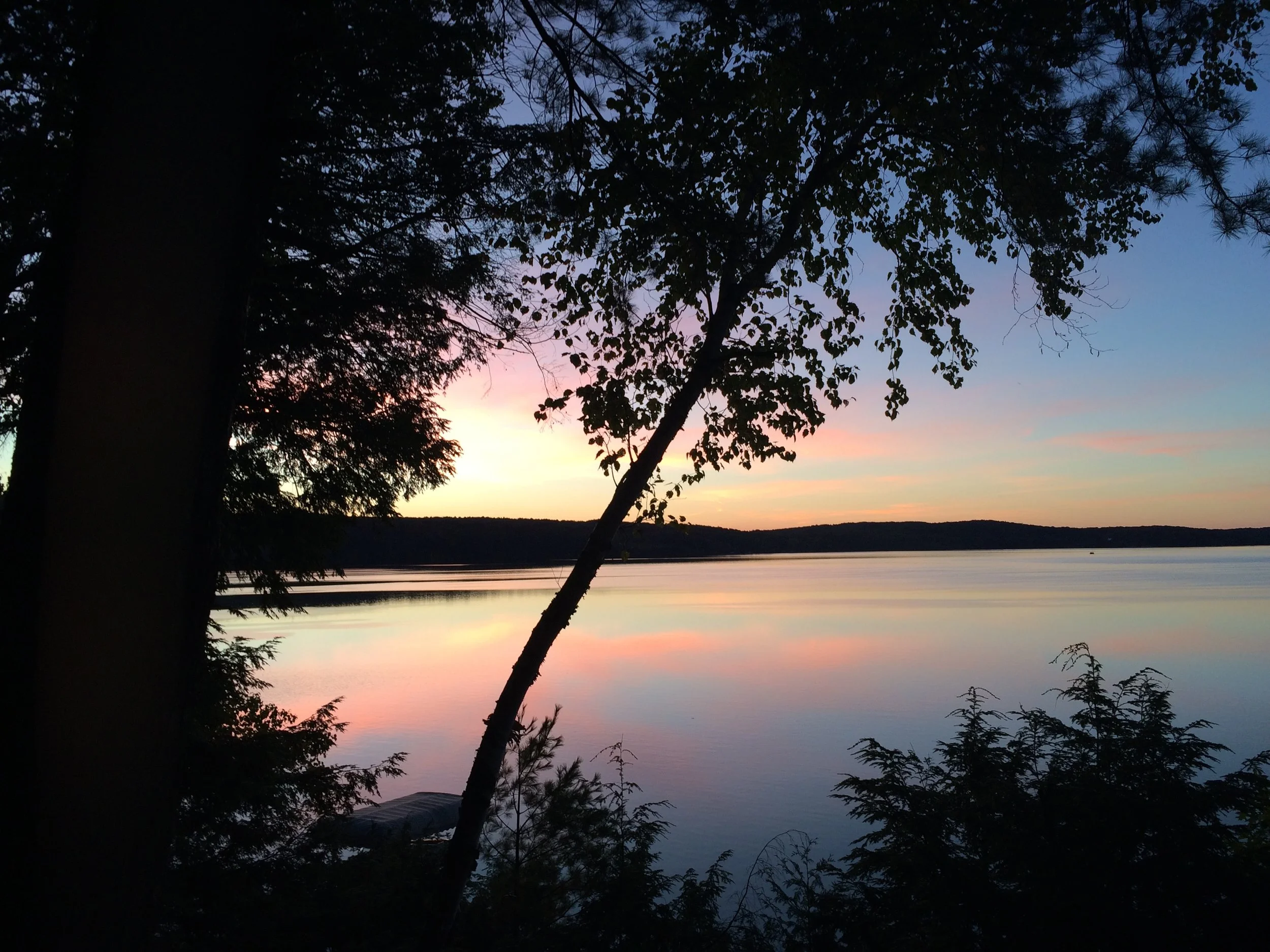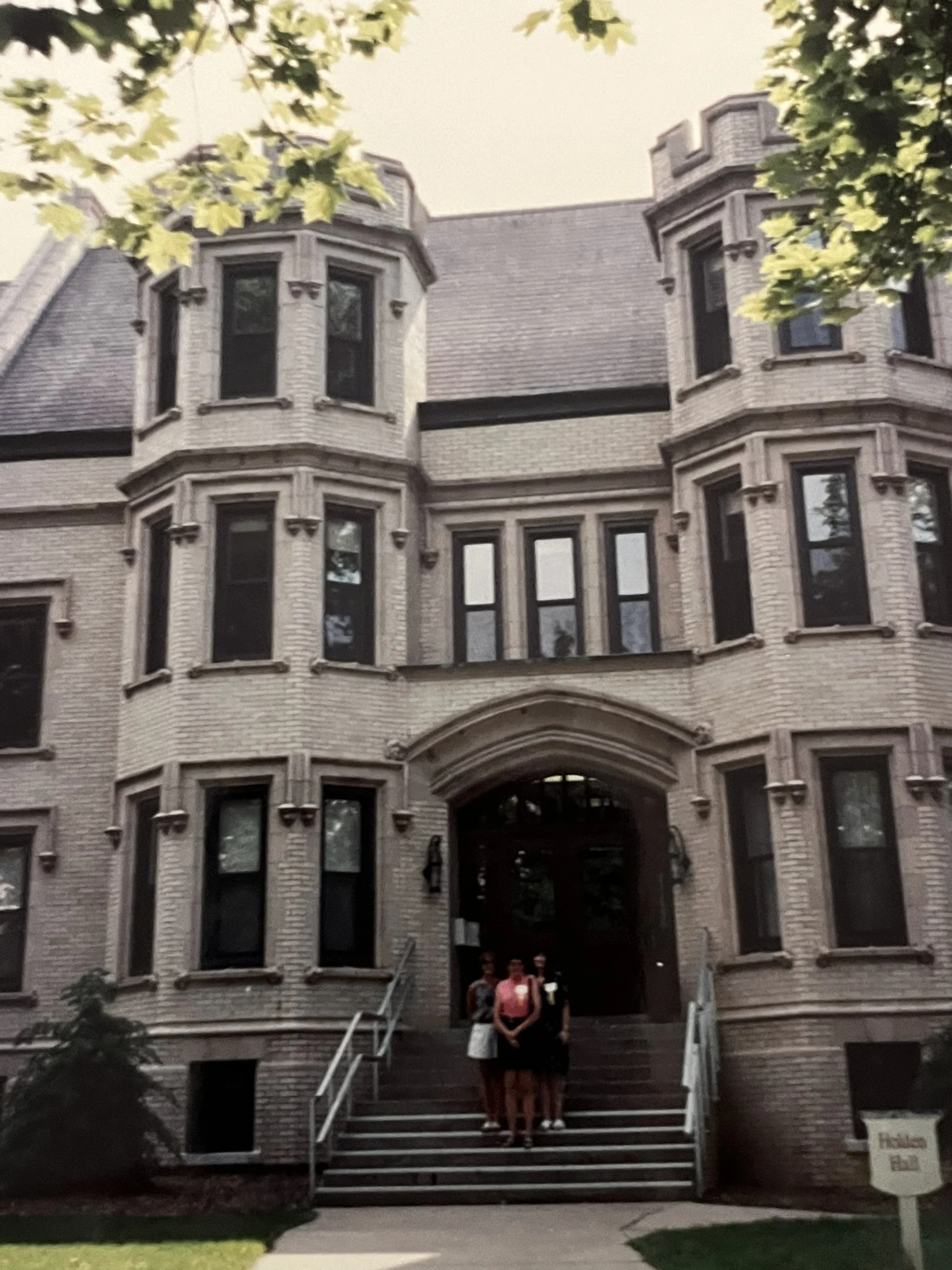“I’ll be glad to be home,” I wrote to a friend after days on the road, sleeping in different beds, disruption to my normal routines.
And yet, I thought to myself, all of this time, I’ve been home -- home, yet not home --for the first place I’d landed was the cabin in Michigan where I’d spent my childhood summers, and weeks and months nearly every year since. It is the place, more than any other, that I consider my soul home – the place where I feel most at peace, most connected to the land, to family, to myself, my spirit. Yet the constant rain and cold had made it feel inhospitable in a way I had not previously experienced. I longed to be warm. Perhaps I simply hadn’t had the time to settle in, for it was just a wayside rest on my journey. I still had the dreaded truck-laden highways of southern Michigan and northern Ohio to traverse.
I was finally making the trip to see my sister in her home in northeast Ohio, a trip I’d made countless times, but where I’d not been since the beginning of the Covid pandemic. The trip was still fraught for me. Immunocompromised as I am, being a two-day drive away from my healthcare providers should I get Covid, and not being in control of my environment -- as I am of my very Covid-safe environment at home -- added elements of anxiety to my travels. It had taken me this long to feel comfortable enough to go into a public restroom, wearing a mask, of course, something I needed to be able to do on this long a trip on urban roads. Perhaps home is where the healthcare providers are.
As I approached the exit on the turnpike nearest where my sister lives, I gazed out on the familiar scenery – the stunning beauty of the Cuyahoga River valley after miles of flat, unremarkable terrain -- and I felt at home, and yet not. When I was young, I’d spent so many hours in that metropolitan park – now a national park, in the hills and sandstone ledges above the valley, the site of so many family picnics and adventures. My first husband’s parents and mine lived on opposite sides of the Cuyahoga, and for several years the winding road between them was a treasured journey, especially in the midnight hour between Christmas Eve and Christmas Day. That was but a memory now.
The route from the turnpike exit to my sister’s home that was once a maze of several different roads and turns is now a straight-line freeway, so different from my years growing up here. It exits onto the road that borders the village where I grew up. As I drove, I passed the lake where I swam, the country club where I went to my first awkward seventh and eighth grade dances, the place by the lake where my adolescent gang of girls spent so many hours laughing and talking in the willows by the lakeshore, the home of my 8th grade boyfriend -- but I passed the turn to the road that would take me to my childhood home. My sister lives a mile or two down the road, and that’s where I was headed.
After I’d moved away in my twenties, my sister’s home was my home away from home, especially in the summer after my mother’s stroke, and again after my mother died and my father was living at home with a caregiver. He had become completely disabled with Parkinson’s and the dementia he’d plunged into after the car accident that killed my mother. He’d been driving, and the grief and guilt seemed to make living in his body/mind intolerable and he’d mostly left it.
When I’d come to visit at Christmas and summers, I’d stay with my sister. We’d have our early morning chats over cups of tea before anyone else was up, go for long walks – often in the village where we grew up, or around her neighborhood. I’d play with her boys – my best buds then and now in their adulthood -- go to their soccer games, play croquet in their backyard, and make our daily trip to the Dairy Queen. Our dogs would romp together. Many years later, my son went to college an hour away from my sister’s, and that’s where I’d stay whenever I’d go visit him. She and her husband were regular audience members in his many concerts there over those four years. Her home was also my regular stop when I’d make the long drive to upstate New York where my son was in grad school. My sister and I would often drive into the Cuyahoga Valley for long walks along the towpath, or walk around the village where we grew up, or go to concerts at Blossom – the summer home of the Cleveland Symphony, or just sit on the couch in her family room watching the multitudes of birds at her many feeders – her favorite pastime. Her home was my home when I returned for my parents’ memorial services, my high school and college reunions, and the spring I helped care for her after her hip replacement. All told, I’ve spent months and years of my life at 1739, and know it as well as I do my own home.
And then here I was, and it was home, so familiar to me, and yet not, for my sister is no longer home in her body/mind most of the time. Perhaps it was her presence more than anything else that made this feel like home all those years. At least she still knows who I am and seems glad that I am here. But it is disquieting being here with her here and yet not, and makes me long for home, my home.
On my last day, I took a few hours away to visit a long-time friend from my college days. On my way there, I drove through the place I called home for so many years -- the village where I grew up -- past my house, my grade school, my friends’ houses, the lake where I learned to swim, my church. Yet, at the house where I grew up it all looks different. They’ve changed the shutters and front door, cut down the pine tree we loved to climb, as well as the exquisite dogwood in the front yard that was my favorite tree in the world. So many of the houses that were there when I was young have been torn down and replaced with McMansions that the place is in many ways unrecognizable to me. But the schoolyard, the baseball fields, the schools’ portico -- with the letters spelling out “Silver Lake School” that my 8th grade class gifted to the school decades ago -- still look the same, as does the church where I went to Sunday School, sang in the choirs, got married, and buried my parents. Nevertheless, despite spending the first twenty years of my life there, the village no longer feels like home. It was such a great place to grow up, but my home is elsewhere now.
My friend lives in the town where I, and my son, went to college, and oddly, this was feeling more like home to me than my hometown, even though I lived here for only three years, and my son for four. This was my first home away from home, the first place where I made my own home away from my parents’, and where my son made his. What an exciting time – for both us. We both remember it as some of the best years of our lives. As I drove through campus, along the street with the new music building where my son spent most of his time all four years he was here on one side and the dorm where both he and I had lived on the other, I felt embraced by a sense of belonging. During my time there, I lived in every single one of the women’s dorms (they weren’t co-ed then as they were when my son was in school there), but it’s my freshman year dorm, where I’d awake at sunrise and listen to the bagpipes, that still feels most like home --that, and the field behind the dorms where I first read Camus’s The Rebel -- the touchstone of my life. Erik Erikson [1] would say that this was the time and place where I forged my identity, my sense of self, and to a certain extent that’s true. Perhaps that, and the fact that it is also infused with my son’s presence and impact here, is why this place, of all the homeplaces I’ve visited on this journey, still holds a sense of home for me.
On my last night with my sister, for a short while she returned, and we were silly and laughing and sisters together in the way that only sisters can be. Snuggled together on that couch in the family room where we’d spent so many hours of our together lives, for a moment I was home there, too. Perhaps home is where the heart is after all, for in that brief hour my heart was full -- of love, mirth, gratitude, and the sense of belonging together that is home.
[1] Erik Erikson was a psychologist best known for his eight stages of psycho-social development. When I went to college at 18, I was still in the stage of “identity vs. confusion,” so it was a formative time. Coincidentally, it was also in college that I first read Erikson and learned about his eight stages -- one of the things I learned in college that has stayed with me all of these years.














